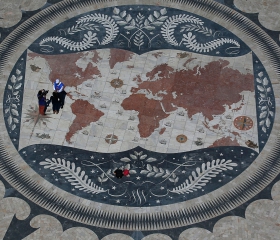Despite all the ambiguity and contradictions of recent events, one thing is clear: in 2015, a bottom line was drawn underneath the long period of development of relations between Russia and its western neighbours. We need to acknowledge that relations between Russia and Europe will have to be built against a background of deep and sustained mutual distrust between government leaders, the political elite and society as a whole.
Russia’s relations with its western neighbours have blown hot and cold throughout 2015. On the one hand, we have seen unprecedented activity, particularly in recent months, with regard to the prospect of Syrian settlement, as the intensity of contacts between East and West on how to overcome the Syrian crisis has risen dramatically. On the other hand, the European Union did not change its position towards Russia. As before, the anti-Russia rhetoric has not disappeared from the pages of European newspapers and magazines. Rather, it has been all over the Internet and on television programmes across the continent. The reaction in Europe to the recent drama in the skies of Syria has been mixed: many people have expressed sympathy for and demonstrated an understanding of Russia’s actions, while others show a clearly biased assessment of Russia’s strategy in Syria and the Middle East as a whole.
Despite all the ambiguity and contradictions of recent events, one thing is clear: in 2015, a bottom line was drawn underneath the long period of development of relations between Russia and its western neighbours. If at the beginning of the year there was still hope in the East and the West that the Ukrainian crisis would soon be resolved, that the economic sanctions and counter-sanctions would be short-lived, and that Moscow and Brussels could return to their dialogue, then by the end of the year all of this faded away. Today, we can say with some confidence that the period of history that began with perestroika in the Soviet Union and lasted almost 30 years is now over.
What will the new model of Russia–Europe relations be like? What principles and features will define this new period of history? What lessons will the two sides learn from the current crisis? We do not have definitive answers to these questions yet; however, we can draw some parameters of this new reality even today.
First of all, we need to acknowledge that relations between Russia and Europe will have to be built against a background of deep and sustained mutual distrust between government leaders, the political elite and society as a whole. Strictly speaking, the levels of trust were not especially high before: it is unlikely that the Ukrainian crisis would have escalated the way it did if mutual trust had existed. However, whereas previously distrust between Russia and Europe was generally regarded as an unfortunate throwback to the Cold War period (and one that was gradually disappearing), now it is a long-term feature of the new reality. And this is also true for the younger generations of Russians and Europeans, who see the Cold War as something from the distant past.
Those who support Russia–Europe cooperation often try to reduce this distrust down to mutual misunderstanding – to misconceptions and stereotypes that exist in the East and the West. Unfortunately, the roots of distrust go much deeper than this. In my opinion, they are connected to fundamental differences in our conceptions of the modern world, the dominating trends in global politics and what the criteria for the future world order could and should be.
If this is the case, then the large-scale plans to build a Greater Europe – to construct comprehensive systems of European security and cooperation, new structures and institutions – are unlikely to succeed. If we could not pull it off at the turn of the century, when the conditions for doing so were far more favourable, then it is almost unimaginable how we could do it now or in the near future. We have to be honest with ourselves. Right now, nobody in the East or the West has any interest in this kind of project, and not a single influential power is prepared to support such initiatives. The deep disappointment with regard to the failure to build a Greater Europe will continue to influence the views of political leaders, and the mood of the general public, for a long time to come.
It seems quite clear that it would be unproductive in the current circumstances to build relations between Russia and Europe on the basis of common values. Not because Russia has ceased to be a European country. And not because common values between the two sides do not exist, they actually do. But because “values” as a notion is both too general and too contradictory to use as the basis for developing a foreign policy strategy – and the current crisis has shown this very clearly. The debate about what true Russian and true European values actually are never seized and it is unlikely to do so any time soon. Now, at a time when both Russia and Europe are facing common and individual challenges of unprecedented scale these debates are becoming even more intense and emotional.
The vulnerability of the “value approach” to international relations has been exposed on a number of occasions, and not only in Europe. The U.S. Middle East strategy from the beginning of the 21st century has been built upon the conviction that the countries in the region should take on and share the fundamental values of Western democracy. And what has this strategy led to? There is no doubt whatsoever that the Middle East is no closer to Western values now that it was 15 or 20 years ago
The fundamental values of peoples and societies are particularly rigid – they change and converge over the course of generations, not a few years. Having said this, neither Russia nor Europe can afford to wait a generation before trying to develop cooperation. Therefore, the most practical and productive thing right now would be to build cooperation around concrete issues where our interests are objectively the same. And rather than focusing on building new and cumbersome structures, such cooperation could be directed at promoting flexible and democratic pan-European regimes in individual sectors.
I would emphasize three areas where the interests of Russia and Europe coincide, and where the promotion of common modes of operation could be especially productive. Above all, we are talking about numerous security issues. Russia and the West appear to have entered a new phase of the arms race, in which Europe has become the center stage. It would not be a giant leap, for example, to assume that once the U.S. deploys its missile defence system in Poland, Russia would respond by deploying its own Iskander missile defence system in the Kaliningrad Region. Events are playing out in a similar way to that of the missile crisis of the mid-1980s. But at least back then channels of communication and reasonable mechanisms for dialogue existed. We don’t have those now, and that is why many people see the current situation as more dangerous than the crisis 30 years ago.
This is why our first task is to prevent the escalation of military tensions, restore dialogue on security issues, expand military contacts, exchange information on defence plans, compare military doctrines, etc. However, we must not forget about the new security challenges that are equally serious for Russia and Europe – international terrorism, political extremism, cybercrime and the threat of technogenic disasters. We can respond to these challenges by establishing an appropriate international regime that includes Russia and its western partners.
The interests of Russia and Europe also coincide on issues of development. Not just economic development, but also social, cultural and humanitarian development. Today’s rapidly changing world presents new challenges to all countries and regions, and the threat of being pushed onto the sidelines of global development objectively brings Eastern and Western Europe closer together.
Of course, the priorities of socioeconomic development in Russia and Europe differ in many ways. Countries of the European Union face chronic stagnation, new financial and monetary crises, the inability to reform the social sector, and falling behind North America and East Asia in terms of technology. For Russia, the most obvious threats are the persistence of the commodity economy, the weakness of small and medium-sized business, corruption and the general ineffectiveness of public administration. Within the context of these somewhat different priorities, however, it seems appropriate to discuss common policies in specific areas. For example, in removing barriers and bureaucratic obstacles to economic cooperation; in standardizing and unifying the transport and logistics infrastructure in Eastern and Western Europe; and in the preservation and expansion of the pan-European educational, scientific and innovation space. We could of course add stopping the sanctions war between the European Union and Russia to this list.
Finally, the third area of common interests between Russia and Europe is related to the rather complicated issues of global governance. In spite of all our differences, mutual grievances and deep distrust of one another, we are nevertheless united by the desire to avoid further destabilization of global politics and prevent the current trend towards chaos and anarchy in the international system from growing stronger. We must not forget that three of the five permanent members of the United Nations Security Council are located in Europe, and that pan-European structures for security and cooperation have for decades been looked up to as a model for other regions and continents.
We could have started here with the creation of international regimes that cover Europe and then Eurasia, and then spread to other regions around the world. Managing migration flows and solving the refugee issue is perhaps the most obvious area for joint efforts. However, tackling environmental issues in our region and coordinating our positions on climate change are equally important. A serious dialogue between the Russian and European parties on a number of fundamental issues in contemporary international law is taking shape. This is all the more significant as historically it was here, on the European continent, that the foundations for the international legal system used by the whole world today were laid.
These tasks may seem excessively mundane to some, but solving them is the only chance we have to lay the new foundations for a common European home in the future. For too long we have been trying to build this house from the roof down, rather from the foundation – with political declarations, rather than concrete actions. This approach has not brought success, even during the period of relative stability in Europe. So there is little hope that it can bring success in the turbulent times we are experiencing now. Our common goal is to move past this dangerous period with as little collateral damage as possible, both for Russia and for Europe.






